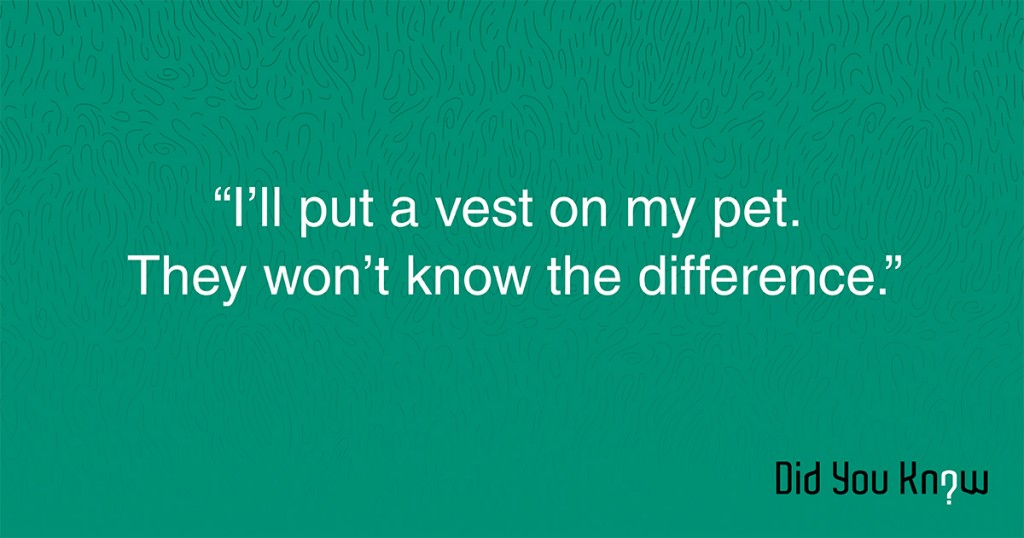- A
- A
- A

Did you know that service dogs shouldn’t be pet while they are working? Service dogs are working dogs doing a special job. They are trained to ignore distractions and focus on their job. One pet on the head can erase months of their training.

Did you know that there are several actions to not take when you see a service dog in public? Do not approach and pet a service dog. Do not ask, “Are you disabled?” It is an invasion of privacy for individuals with disabilities to be asked about their illness or disability in public. Don’t assume that service dogs only serve blind people. There are people with different kinds of disabilities that require the aid of their service dogs.
Did you know that service dogs have been trained to perform one or more tasks for a person with a disability?
“Under the ADA, a service animal is defined as a dog that has been individually trained to do work or perform tasks for an individual with a disability. The task(s) performed by the dog must be directly related to the person’s disability.” Americans with Disabilities Act
Examples of tasks include guiding people who are blind, alerting deaf people, warning and protecting a person who is having a seizure, reminding a person with a mental health disability to take prescribed medications, bringing medicines in a crisis, or notifying a person with diabetes who is having low or high blood sugar level.
Some service dogs go everywhere with their human partners in public, which is protected under the ADA. Religious institutions and organizations are specifically exempt from the ADA. Please check with your state laws first!
Did you know that the ADA does not require service animals to be professionally trained? People with disabilities have the right to train the dog themselves and are not required to use a professional service dog training program.

Did you know that businesses are not allowed to ask service dogs’ owners these questions: “Do you have papers to show your dog is a certified service dog?” “What’s your disability?” “Why do you need that dog in here?” “Can you show me what the service dog does for you?” The ADA does not require service animals to wear a vest, ID tag, or specific harness. Also, service animals are not required to be certified, nor are they required to have proof of training or a license. The Americans with Disabilities Act was written this way to protect the privacy of people with disabilities. Under the ADA, business owners can only ask two questions when someone with a service animal walks in: “Is this a service animal?” “What is it trained to do?”
Did you know that emotional support animals are not the same as service animals under the ADA? Emotional Support Animals are not protected under the ADA as Service Animals. Although Emotional support animals provide comfort to many people in courts, hospitals, and at home, they do not require training. Properly documented Emotional Support Animals can be legally kept in housing that prohibits pets. They can also be brought on airplanes. However, because they are not service animals, they cannot be brought to restaurants, movie theaters, stores, and public places with their owners.

Did you know that it is unfair and illegal in some states to try to pass a pet as a service dog in public? Some people want to bring their pets everywhere with them and buy online certificates and vests with patches on them. However, that would potentially endanger other service animals and people with disabilities who have rights in public. It gives the wrong impression of trained service animals and causes barrier issues for people with disabilities. There have been lawsuits where phony service dogs have attacked trained service dogs in public places.
Did you also know that fraudulently representing service animals is a misdemeanor in some states, such as Florida?
Did you know that business owners have the right to exclude service animals in certain situations? According to the U.S. Code of Federal Regulations’ § 36.302, there are two reasons for a business owner to dismiss a service dog:
- The service dog is out of control and the handler isn’t doing anything about it.
- The service dog isn’t housebroken and urinates or defecates inappropriately.
If the service dog’s handler is asked to leave due to the dog’s behavior, the unaccompanied handler must be given the opportunity to obtain goods or services, with the dog excluded from the premises.
Did you know that guests with disabilities who use service animals can reserve any available room at a hotel as any other guests and may not be restricted to “pet-friendly” rooms? Hotels are not allowed to charge guests with service dogs for cleaning. However, if service dogs cause damages, guests with disabilities may be charged the same damage fee as other guests.
Did you know that under the Fair Housing Act, landlords are to provide reasonable accommodation for the use of animals that provide assistance or perform tasks for people with disabilities? They must also allow the use of animals that provide emotional support. For information about these Fair Housing Act requirements see U.S. Department of Housing and Urban Development’s Notice on Service Animals and Assistance Animals for People with Disabilities in Housing and HUD-funded Programs.
Did you know that both service animals and emotional support animals are covered under the Air Carrier Access Act, which is a Federal law that protects the rights of people with disabilities during air travel? For more information about traveling with a service dog or emotional support animals, check out the §382.55 Miscellaneous provisions of the U.S. Department of Transportation 14 CFR Part 382, Nondiscrimination on the Basis of Disability in Air Travel.
The more we know about service animals and respect the jobs they do, the better everyone, including small children, business owners, and people with disabilities, can interact amiably in the community. For more information about regulations and guidelines for Service Animals, check out the list of our resources!
Resources:
Americans with Disabilities Act
Americans with Disabilities Act’s Service Animals Guideline
Fair Housing Act
Air Carrier Access Act
Department of Transportation’s Guidance Concerning Service Animals in Air Transportation
Code of Federal Regulations